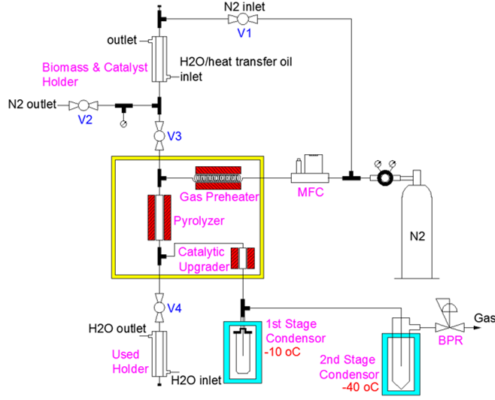Introduction
This patented unit offers a solution for pyrolysis of solid and/or liquid renewable feedstock using a heterogeneous catalyst. Via an in-situ or ex-situ approach under N2 at an atmospheric pressure (catalytic pyrolysis) or under H2 at a high pressure (catalytic hydro-pyrolysis).
Catalytic upcycling circular carbon such as lignocellulosic biomass or plastics, contributes to a circular (bio-)economy. R&D is often performed in a lab- & pilotscale unit, requiring:
-a universal feeding of solids and liquids (preferably in a continuous manner);
-collection of all the gaseous, liquid, and solid products for mass/carbon balance and offline qualification/quantification;
-‘catalytic reaction – catalyst regeneration’ cycles for catalyst life-time and regenerability;
-an operation at high temperatures and pressures.
CPU solutions in short
- A solution for the integration of a customized CPU to your existing catalytic conversion system can be offered. This provides an additional feed line for the co-conversion of circular carbon circular products.
- A solution for the integration of an in-situ or operando analysis system to a standard/customized CPU can be offered.
- Various circular carbon such as waste plastics, sludge, sawdust, and non-edible vegetable oil, and the pyrolysis protocols can be offered to catalyst players for testing the refinery catalyst for the (co-)conversion of circular carbon.
- Various state-of-the-art refinery catalysts such as zeolite and E-cat, and the modified catalysts can be offered to bio-refinery for testing the circular carbon for the (co-)production of circular (bio-)based fuels and chemicals.
FEATURES
Specification of a standard CPU
Feedstock:
• Solid (10 – 50 g/h, (semi-continuous)
• Liquid (10 – 100 g/h, (continuous)
Gas:
N2 or H2 (20 – 100 ml/h)
Catalyst:
Solid (particle size of 300 – 500, 800 – 1000 μm, 5 – 20 g)
Pretreatment reactor:
25 °C – 250 °C
Pyrolysis reactor:
400 °C – 600 °C
Catalysis reactor:
400 °C – 600 °C
Reaction pressure:
1 – 60 bar
Condensation:
3-Stage condensation (from -40 °C to 5 °C)



